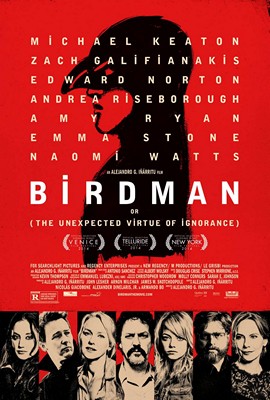Ryan Wattonville
Finding a perfect balance between satire, sincerity, and just plain drama, Birdman or (The Unexpected Virtue of Ignorance) is a sparkling attack on the senses that is both exhilarating and emotionally draining.
In this tale of a former movie star’s desperate attempt to regain his relevance, Riggan Thomson (Michael Keaton), an aging actor known for a now decades-old superhero trilogy also titled “Birdman,” turns to Broadway. With the help of his lawyer/producer/friend Jake (Zach Galifianakis), Riggan adapts an old Raymond Carver short story for the stage in hopes of reestablishing himself within the industry.
Riggan faces disaster at every turn as he juggles his roles as both the lead actor and director of the play while taming the attitudes of the rest of his cast, which include a brilliant but psychotic method actor named Mike Shiner (Edward Norton) and his current lover.
Riggan’s character reveals itself through a series of behind the scenes battles with his costars, his sarcastic recovering drug addict daughter/assistant Sam (Emma Stone), and a personal demon in the form of Birdman’s voice.
No amount of personal success can stop the voice in his head, however, as the film documents Riggan’s battle with the inner voice of Birdman and constant thoughts of suicide.
What separates Birdman from other comedic dramas, or other films in general, is the fact that the whole film is shot seemingly in one take. The camera winds around Broadway’s St. James Theater, and takes in all the drama while jazzy drums fill in uneventful following shots. This technique allows Alejandro Gonzáles Iñarrítu and cinematographer Emmanuel Lubezki to literally and effortlessly blend one scene into the other, creating a unique, kind of “wallflower gone rogue” perspective. Not only does the constant shot give the film a steady source of energy and makes the whole experience extremely volatile and engaging, but it also finds a perfect niche within the intense dialogue that unfolds between the characters.
While the effect does seem a bit gimmicky at times, it also enables the characters to jump off the screen with ease in what feels like a real behind the scenes look into all that is Broadway. As an invisible observer, the camera goes on a compelling journey, documenting not just the drama and personal attacks aimed at Riggan, but also the aftermath. It stares Sam in the face as she thrashes her father about the corroded state of his image and career, taking in all the resentment, and then follows him to his dressing room and watches him tear the place apart in frustration.
It’s incredibly easy to get lost in a film like Birdman as every aspect of the film works in unison to create something spectacular. The witty and sarcastic story provides the perfect medium for the film’s seamless cinematography as the camera unravels complex relationships with ease. Even the music, although minimal, served a vital purpose in providing a pulse to keep the film alive while the camera found its way from one scene to the next. It’s no wonder that Birdman is receiving Oscar buzz this season, and I wouldn’t be surprised if, come February, we see multiple people take home awards for this great film.
Photo Courtesy of Regency Enterprises











